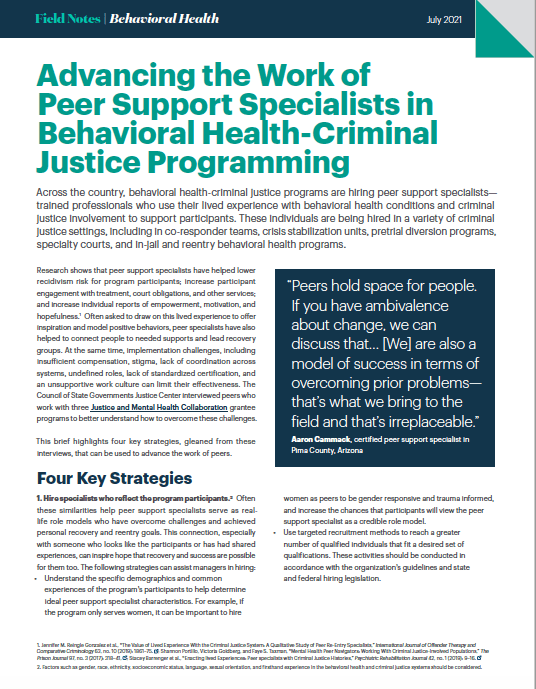Advancing the Work of Peer Support Specialists in Behavioral Health-Criminal Justice Programming
Advancing the Work of Peer Support Specialists in Behavioral Health-Criminal Justice Programming
Peer support specialists are often asked to draw on their lived experience with behavioral health conditions and criminal justice involvement to support participants of behavioral health-criminal justice programs. This experience allows them to offer inspiration and model positive behaviors, as well as connect people to needed supports and lead recovery groups, among other benefits. At the same time, implementation challenges can limit their effectiveness. The Council of State Governments Justice Center interviewed peers who work with three Justice and Mental Health Collaboration grantee programs to better understand how to overcome these challenges. This brief highlights four key strategies gleaned from these interviews, that can be used to advance the work of peer support specialists.
Advancing the Work of Peer Support Specialists in Behavioral Health-Criminal Justice Programming
Across the country, behavioral health-criminal justice programs are hiring peer support specialists—trained professionals who use their lived experience with behavioral health conditions and criminal justice involvement to support participants. These individuals are being hired in a variety of criminal justice settings, including in co-responder teams, crisis stabilization units, pretrial diversion programs, specialty courts, and in-jail and reentry behavioral health programs.
Research shows that peer support specialists have helped lower recidivism risk for program participants; increase participant engagement with treatment, court obligations, and other services; and increase individual reports of empowerment, motivation, and hopefulness.1
Often asked to draw on this lived experience to offer inspiration and model positive behaviors, peer specialists have also helped to connect people to needed supports and lead recovery groups. At the same time, implementation challenges, including insufficient compensation, stigma, lack of coordination across systems, undefined roles, lack of standardized certification, and unsupportive work culture can limit their effectiveness. The Council of State Governments Justice Center interviewed peers who work with three Justice and Mental Health Collaboration grantee programs to better understand how to overcome these challenges.
This brief highlights four key strategies gleaned from these interviews, that can be used to advance the work of peers.
Four Key Strategies
1. Hire specialists who reflect the program participants.2 Often these similarities help peer support specialists serve as real-life role models who have overcome challenges and achieved personal recovery and reentry goals. This connection, especially with someone who looks like the participants or has had shared experiences, can inspire hope that recovery and success are possible for them too. The following strategies can assist managers in hiring:
- Understand the specific demographics and common experiences of the program’s participants to help determine ideal peer support specialist characteristics. For example, if the program only serves women, it can be important to hire women as peers to be gender-responsive and trauma-informed and increase the chances that participants will view the peer support specialist as a credible role model.
- Use targeted recruitment methods to reach a greater number of qualified individuals that fit a desired set of qualifications. These activities should be conducted in accordance with the organization’s guidelines and state and federal hiring legislation.
2. Strategically onboard peer support specialists. Many peer support specialists have direct lived experience in the correctional facility or community-based program in which they are now working. The following tips can help ensure that they are welcomed as staff members and receive the necessary assistance and direction to do their jobs well:
- Clarify the job description and expectations with peer support specialists and with non-peer staff members.
- Identify staff or stakeholders with concerns, provide them with education about the value of peer support specialists, and facilitate formal introductions upon hiring to explain peers’ activities and responsibilities. This groundwork will promote mutual respect and collaboration.
- Provide peer support specialists with professional development opportunities early on, especially if this is their first professional job. They may also benefit from discussions and training on how to address challenges that arise in the workplace.
- Ensure that they have access to relevant training that supports their work such as Trauma Informed Care, Mental Health First Aid, and Motivational Interviewing.
- Integrate peers as you would with any staff. Have them involved in staff/case conferencing meetings so that they are part of an integrated team and receive necessary program updates.
3. Provide supportive, ongoing supervision. The growth, retention, and advancement of peer support specialists in a program largely depend on the support that they receive from their supervisory staff. The peer support specialists interviewed offered the following recommendations for program leaders:
- When possible, hire supervisors who have lived experience in the behavioral health or criminal justice system, because they can better help the peer support specialists navigate the nuances and challenges of the position.
- Help peer support specialists set boundaries with program participants to avoid employee burnout and minimize their risk of vicarious traumatization. This might include discussing appropriate modes of communication, tips on ways to deal with someone completing the program, and encouraging the use of wellness techniques.
- Advocate for raises and promotions of peer support specialists to aid in their retention and advancement in the organization. While this is good supervision practice generally, it is especially important because many salaries for peer support specialists are very low and can hinder retention.
- To better understand the nuances of the role and build supervisor skills, supervisors can consult resources such as the City of Philadelphia Department of Behavioral Health and Intellectual Disability Services’ Peer Support Toolkit.
4. Include peer support specialists in policy-level discussions and promote them to leadership roles. Most behavioral health-criminal justice programs hire peer support specialists for direct service responsibilities. However, the interviewed peer support staff highlighted the importance of including peer support specialists in program and policy development conversations as well. Because of their lived experience, peers can offer a necessary perspective on ways to improve policies and practices. Some ways to involve them in leadership roles and discussions include:
- Soliciting policy/practice-level feedback from peers, informed by their lived experience, to better align program practices with a recovery-oriented environment.
- Inviting them to serve as trainers and facilitators for various types of law enforcement training so that they can provide perspectives on their experience with the criminal justice and behavioral health systems. Peer support specialists can also offer testimonials on their own progress and stability, highlighting for law enforcement professionals that while mental illness is often episodic, with the proper support, recovery is possible.3
- Providing opportunities for peers to advocate for legislative change to behavioral health and criminal justice policies at local, state, and federal levels. A place to start may include enrolling them in NAMI SMART, a free, hands-on advocacy training program that helps people living with mental illness, and their friends and family, build practical advocacy skills.
- Creating a workplace environment that values employees’ experiences and offers opportunities for hiring and advancement at every level of leadership.
Footnotes
1Jennifer M. Reingle Gonzalez et al., “The Value of Lived Experience With the Criminal Justice System: A Qualitative Study of Peer Re-Entry Specialists,” International Journal of Offender Therapy and Comparative Criminology 63, no. 10 (2019): 1861–75. ; Shannon Portillo, Victoria Goldberg, and Faye S. Taxman, “Mental Health Peer Navigators: Working With Criminal Justice-Involved Populations,” The Prison Journal 97, no. 3 (2017): 318–41, ; Stacey Barrenger et al., “Enacting lived Experiences: Peer specialists with Criminal Justice Histories,” Psychiatric Rehabilitation Journal 42, no. 1 (2019): 9–16.
2Factors such as gender, race, ethnicity, socioeconomic status, language, sexual orientation, and firsthand experience in the behavioral health and criminal justice systems should be considered.
3The National Alliance on Mental Illness (NAMI) has developed a resource for peer support specialists to prepare for their role in Crisis Intervention Response Training. See NAMI, The CIT Coordinators’ Guide to the Peer and Family Perspective Panel (Arlington, VA: NAMI), ; NAMI also created a training course in 2020 that peer support specialists and others can take to learn how to share their story with law enforcement. This course was funded by the Bureau of Justice Assistance through the Vera Institute of Justice. See “Sharing Your Story with Law Enforcement: In-Person Training Session,” NAMI, accessed July 28, 2021.
This project was supported by Grant No. 2019-MO-BX-K001 awarded by the Bureau of Justice Assistance. The Bureau of Justice Assistance is a component of the Department of Justice’s Office of Justice Programs, which also includes the Bureau of Justice Statistics, the National Institute of Justice, the Office of Juvenile Justice and Delinquency Prevention, the Office for Victims of Crime, and the SMART Office. Points of view or opinions in this document are those of the author and do not necessarily represent the official position or policies of the U.S. Department of Justice.
Dig Deeper
The Council of State Governments Justice Center offers free in-depth subject matter expertise and can connect you to programs that currently have peer support specialists on staff. Visit the Center for Justice and Mental Health Partnerships to learn more.
Additional Resources
Recovery Support Tools and Resources: Peers by the Substance Abuse and Mental Health Services Administration (SAMHSA).
Evidence for Peer Support by Mental Health America.
Family, Parent and Caregiver Peer Support in Behavioral Health by SAMHSA
Project Credits
Writing: Rachel Lee, CSG Justice Center
Research: Rachel Lee, CSG Justice Center
Advising: Allison Upton and Demetrius Thomas, CSG Justice Center
Editing: Darby Baham and Emily Morgan, CSG Justice Center
Design: Michael Bierman
Public Affairs: Ruvi Lopez, CSG Justice Center
Web Development: Andrew Currier, CSG Justice Center
Interviewees:
Aaron Cammack, Certified Peer Support Specialist, Consolidated Misdemeanor Problem Solving Court Case Manager, Community Bridges Inc. in Pima County, AZ
Angela Warren, Paraprofessional Services Coordinator, Advantage Behavior Health Systems in Athens-Clarke County, GA
Kasie Robbins, Supervisor, Peer Support Specialist, NAMI Maine
Nikki Butler, Peer Support Specialist, NAMI Maine
ABOUT THE AUTHOR
The sharp rise in school shootings over the past 25 years has led school officials across the U.S.…
Read MoreA three-digit crisis line, 988, launched two years ago to supplement—not necessarily replace—911. Calling 988 simplifies access to…
Read MoreIt would hardly be controversial to expect an ambulance to arrive if someone called 911 for a physical…
Read More Taking the HEAT Out of Campus Crises: A Proactive Approach to College Safety
Taking the HEAT Out of Campus Crises: A Proactive Approach to College Safety
The sharp rise in school shootings over the past 25 years has…
Read More From 911 to 988: Salt Lake City’s Innovative Dispatch Diversion Program Gives More Crisis Options
From 911 to 988: Salt Lake City’s Innovative Dispatch Diversion Program Gives More Crisis Options
A three-digit crisis line, 988, launched two years ago to supplement—not necessarily…
Read More Matching Care to Need: 5 Facts on How to Improve Behavioral Health Crisis Response
Matching Care to Need: 5 Facts on How to Improve Behavioral Health Crisis Response
It would hardly be controversial to expect an ambulance to arrive if…
Read More











